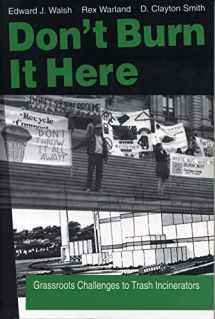
Don’t Burn it Here: Grassroots Challenges to Trash Incinerators
ISBN-13:
9780271016641
ISBN-10:
0271016647
Edition:
1
Author:
Ed Walsh, Rex hanson, Douglas Clayton Smith
Publication date:
1997
Publisher:
Penn State University Press
Format:
Paperback
280 pages
FREE US shipping
Book details
ISBN-13:
9780271016641
ISBN-10:
0271016647
Edition:
1
Author:
Ed Walsh, Rex hanson, Douglas Clayton Smith
Publication date:
1997
Publisher:
Penn State University Press
Format:
Paperback
280 pages
Summary
Don’t Burn it Here: Grassroots Challenges to Trash Incinerators (ISBN-13: 9780271016641 and ISBN-10: 0271016647), written by authors
Ed Walsh, Rex hanson, Douglas Clayton Smith, was published by Penn State University Press in 1997.
With an overall rating of 4.4 stars, it's a notable title among other
books. You can easily purchase or rent Don’t Burn it Here: Grassroots Challenges to Trash Incinerators (Paperback) from BooksRun,
along with many other new and used
books
and textbooks.
And, if you're looking to sell your copy, our current buyback offer is $0.54.
Description
When first proposed in this country during the 1970s, waste-to-energy (WTE) incinerators appeared to be ideal solutions to the growing mounds of trash in our "throw-away" society. Promising to convert useless garbage into electricity while saving precious landfill space, trash incinerators seemed perfectly timed to respond to a national need. Within a decade, however, a grassroots anti-incineration movement emerged as a vibrant offshoot of the environmental movement. In Don't Burn It Here, sociologists Edward Walsh, Rex Warland, and D. Clayton Smith examine this grassroots movement through detailed analyses of the struggles surrounding proposals to build eight municipal incinerators in Pennsylvania, New York, and New Jersey. The eight case histories that form the heart of the book are comparable to hundreds of others across the U.S. The authors' research is based on interviews, focus group discussions, extensive newspaper files, and questionnaire responses from participants on both sides of the conflicts. A final chapter examines the similarities and differences between the three successful projects and the five defeated ones. An overview of the history of the modern incinerator in the U.S. and the emergence of a major national opposition movement provides the necessary context, and throughout the book, the authors make useful comparisons to other national movements seeking legal justice for deprived collectivities such as women and ethnic groups. This project was supported by a grant from the Ford Foundation's Fund for Research in Dispute Resolution. Striving to maintain a balanced treatment of both sides of the incinerator battles, the authors provide fresh theoretical and methodological perspectives on a new type of collective action. They also help to close the gap between theory and empirical data in the social sciences.


We would LOVE it if you could help us and other readers by reviewing the book
Book review

Congratulations! We have received your book review.
{user}
{createdAt}
by {truncated_author}


